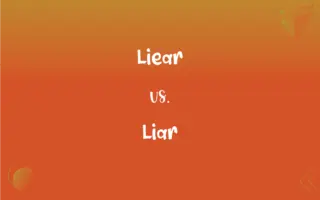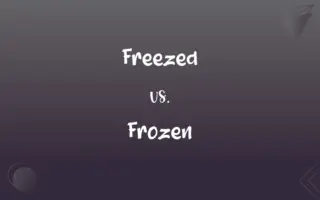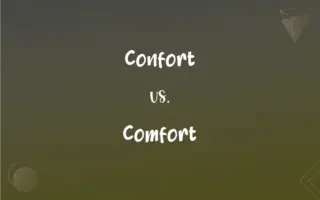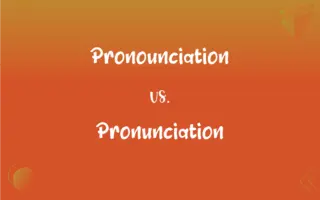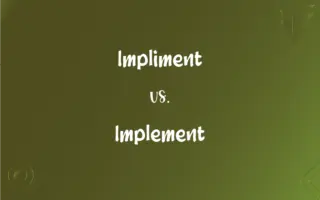Knowlege vs. Knowledge: Mastering the Correct Spelling
Edited by Aimie Carlson || By Janet White || Updated on March 13, 2024
The incorrect spelling is "knowlege," while the correct spelling is "knowledge." Knowledge refers to the understanding or awareness of facts, information, or skills.
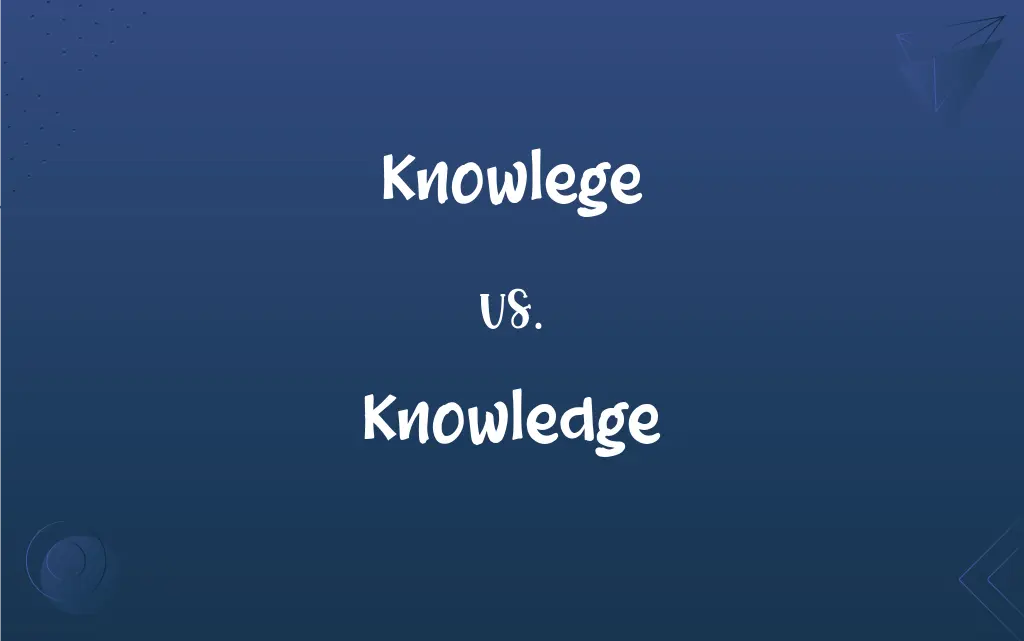
Which is correct: Knowlege or Knowledge
How to spell Knowledge?

Knowlege is Incorrect

Knowledge is Correct
ADVERTISEMENT
Key Differences
Remember that the middle of 'knowledge' sounds like 'all edge,' to remind you of the silent 'd.'
Connect the 'd' in 'knowledge' with the 'd' in 'understanding,' as both are about comprehension.
Think of 'ledge' as the second part of the word, as in 'knowledge gives you an edge.'
Remember that 'knowledge' has the word 'know' in it, followed by a 'd.'
Use the mnemonic “Know All the Details” to remember 'know,' 'a,' 'd,' and 'ge.'
ADVERTISEMENT
Correct usage of Knowledge
We tested their knowlege with a quiz.
We tested their knowledge with a quiz.
Sharing knowlege is important in education.
Sharing knowledge is important in education.
He has a vast knowlege of history.
He has a vast knowledge of history.
The book is a compilation of ancient knowlege.
The book is a compilation of ancient knowledge.
Her knowlege on the topic is impressive.
Her knowledge on the topic is impressive.
Knowledge Definitions
In philosophy, knowledge is justified true belief.
The debate on the nature of knowledge is ancient.
Knowledge is the factual, theoretical, or practical understanding of a subject.
His knowledge of physics is extensive.
Knowledge is also a measure of competency or expertise in a specific field.
He demonstrated his knowledge during the quiz.
Knowledge encompasses the sum of what is known collectively within a social group or domain.
The knowledge of ancient civilizations is still being studied.
The state or fact of knowing
Humans naturally aspire to knowledge.
Familiarity, awareness, or understanding gained through experience or study
Has great knowledge of these parts.
Has only limited knowledge of chemistry.
The sum or range of what has been perceived, discovered, or learned
The extraordinary knowledge housed in the library.
(Archaic) Carnal knowledge.
The fact of knowing about something; general understanding or familiarity with a subject, place, situation etc.
His knowledge of Iceland was limited to what he'd seen on the Travel Channel.
Awareness of a particular fact or situation; a state of having been informed or made aware of something.
Intellectual understanding; the state of appreciating truth or information.
Knowledge consists in recognizing the difference between good and bad decisions.
Familiarity or understanding of a particular skill, branch of learning etc.
Does your friend have any knowledge of hieroglyphs, perchance?
A secretary should have a good knowledge of shorthand.
(philosophical) Justified true belief
Sexual intimacy or intercourse (now usually in phrase carnal knowledge).
(obsolete) Information or intelligence about something; notice.
The total of what is known; all information and products of learning.
His library contained the accumulated knowledge of the Greeks and Romans.
(countable) Something that can be known; a branch of learning; a piece of information; a science.
(obsolete) Acknowledgement.
(obsolete) Notice, awareness.
The deep familiarity with certain routes and places of interest required by taxicab drivers working in London, England.
(obsolete) To confess as true; to acknowledge.
The act or state of knowing; clear perception of fact, truth, or duty; certain apprehension; familiar cognizance; cognition.
Knowledge, which is the highest degree of the speculative faculties, consists in the perception of the truth of affirmative or negative propositions.
That which is or may be known; the object of an act of knowing; a cognition; - chiefly used in the plural.
There is a great difference in the delivery of the mathematics, which are the most abstracted of knowledges.
Knowledges is a term in frequent use by Bacon, and, though now obsolete, should be revived, as without it we are compelled to borrow "cognitions" to express its import.
To use a word of Bacon's, now unfortunately obsolete, we must determine the relative value of knowledges.
That which is gained and preserved by knowing; instruction; acquaintance; enlightenment; learning; scholarship; erudition.
Knowledge puffeth up, but charity edifieth.
Ignorance is the curse of God;Knowledge, the wing wherewith we fly to heaven.
That familiarity which is gained by actual experience; practical skill; as, a knowledge of life.
Shipmen that had knowledge of the sea.
Scope of information; cognizance; notice; as, it has not come to my knowledge.
Why have I found grace in thine eyes, that thou shouldst take knowledge of me?
Sexual intercourse; - usually preceded by carnal; same as carnal knowledge.
To acknowledge.
The psychological result of perception and learning and reasoning
Knowledge can refer to the awareness or familiarity gained by experience.
She has intimate knowledge of the local customs.
Knowledge Sentences
His knowledge of world capitals is remarkable.
She shared her knowledge of gardening with the community.
The quiz tested our knowledge of American history.
The internet is a vast resource of knowledge.
They use games to teach children knowledge of math.
He has a deep knowledge of classical music.
The professor has a wealth of knowledge in physics.
Expanding our knowledge is essential for personal growth.
Their knowledge of the law helped them win the case.
Reading is a great way to increase your knowledge.
She is always eager to acquire new knowledge.
His knowledge of different cultures is extensive.
Gaining knowledge about healthy eating can improve your life.
The library is a treasure trove of knowledge.
The museum offers knowledge about the natural world.
Her knowledge of poetry won her the competition.
The conference gathered experts to share knowledge on environmental issues.
Her knowledge of ancient languages is impressive.
The seminar aims to broaden participants' knowledge of finance.
Practical knowledge is as important as theoretical knowledge.
They exchanged knowledge on sustainable farming practices.
Sharing knowledge can inspire others to learn.
His knowledge of computer programming is self-taught.
Increasing our knowledge of renewable energy sources is vital.
He dedicated his life to the pursuit of knowledge.
Knowledge Idioms & Phrases
To my knowledge
According to what I know.
To my knowledge, the meeting is still scheduled for 3 PM.
Working knowledge
A basic understanding of a subject sufficient to deal with it.
He has a working knowledge of Spanish, enough to get by on his trip.
A wealth of knowledge
Having a lot of knowledge about a particular subject.
The retired professor is a wealth of knowledge on ancient history.
First-hand knowledge
Knowledge gained through direct experience.
She has first-hand knowledge of the city's history from living there for decades.
Lack of knowledge
Not knowing something.
Their project failed due to a lack of knowledge in financial management.
Common knowledge
Something that is known by many people.
It's common knowledge that the earth orbits the sun.
Encyclopedic knowledge
Having a broad and detailed knowledge, like an encyclopedia.
His encyclopedic knowledge of movies always impresses his friends.
Knowledge is power
Being informed about something gives you control.
In negotiations, knowledge is power; understanding the other side's needs can give you an advantage.
Expand one's knowledge
To learn more about a subject.
She reads extensively to expand her knowledge of world religions.
Pool of knowledge
The collective knowledge of a group or society.
The internet has become a vast pool of knowledge accessible to everyone.
FAQs
Why is it called knowledge?
The term "knowledge" comes from the Old English 'cnawan,' meaning 'to know,' and '-læce,' which indicates condition or quality.
What is the verb form of knowledge?
The related verb is "to know."
What is the singular form of knowledge?
"Knowledge" is uncountable and does not have a singular or plural form.
Which preposition is used with knowledge?
"Of" is commonly used, as in "knowledge of something."
What is the pronunciation of knowledge?
Pronounced as /ˈnɒ.lɪdʒ/.
Which vowel is used before knowledge?
It could be any vowel depending on the context; there is no fixed vowel.
What is the plural form of knowledge?
"Knowledge" is uncountable and does not have a plural form.
Which conjunction is used with knowledge?
"And" can be used, as in "knowledge and understanding."
Is knowledge a negative or positive word?
Generally positive, but context-dependent.
What is the root word of knowledge?
The root word is "know."
Is knowledge a collective noun?
No, it's not a collective noun.
Which article is used with knowledge?
"The" can be used, depending on context, as in "the knowledge."
Is knowledge a countable noun?
No, it is an uncountable noun.
What is the first form of knowledge?
"Knowledge" itself is the base form.
What is the second form of knowledge?
Nouns do not have a second form like verbs do.
Is knowledge an abstract noun?
Yes, it is an abstract noun.
How many syllables are in knowledge?
Two syllables.
Is the word 'knowledge' imperative?
No, it is not imperative.
What is a stressed syllable in knowledge?
The first syllable, "know," is stressed.
What is the opposite of knowledge?
The opposite could be "ignorance."
How is knowledge used in a sentence?
Example: His extensive knowledge in mathematics helped him solve complex problems.
Is knowledge a noun or adjective?
Knowledge is a noun.
Is knowledge an adverb?
No, it's not an adverb.
Is knowledge a vowel or consonant?
It's a word, not a vowel or consonant.
How do we divide knowledge into syllables?
Knowl-edge.
Which determiner is used with knowledge?
"The," "some," or "any" can be used depending on the context.
What is the third form of knowledge?
Nouns do not have a third form like verbs do.
Is the term 'knowledge' a metaphor?
Not inherently, but it can be used metaphorically.
What part of speech is knowledge?
It is a noun.
What is another term for knowledge?
Another term could be "understanding" or "expertise."
About Author
Written by
Janet WhiteJanet White has been an esteemed writer and blogger for Difference Wiki. Holding a Master's degree in Science and Medical Journalism from the prestigious Boston University, she has consistently demonstrated her expertise and passion for her field. When she's not immersed in her work, Janet relishes her time exercising, delving into a good book, and cherishing moments with friends and family.
Edited by
Aimie CarlsonAimie Carlson, holding a master's degree in English literature, is a fervent English language enthusiast. She lends her writing talents to Difference Wiki, a prominent website that specializes in comparisons, offering readers insightful analyses that both captivate and inform.
